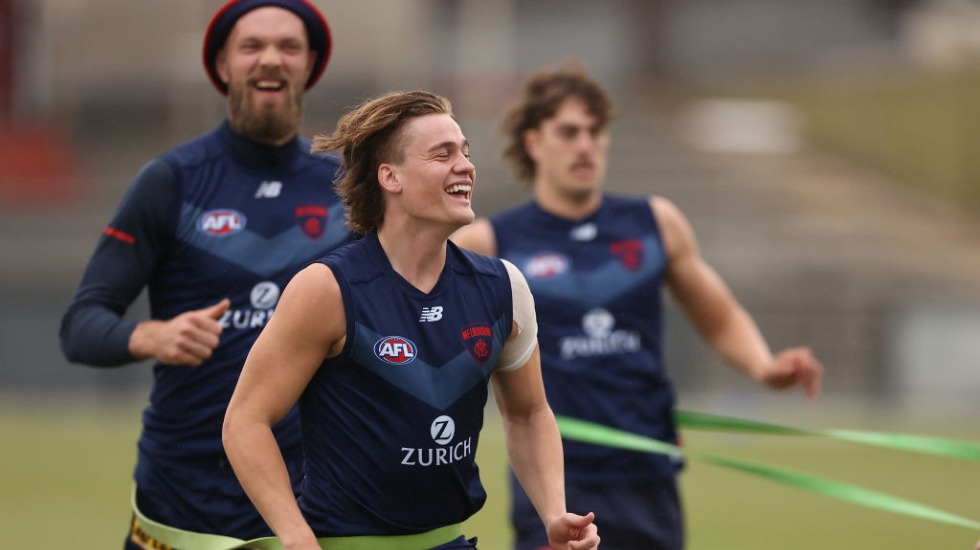Melbourne’s Max Gawn, Trent Rivers and Luke Jackson enjoy training at Lathlain Park on Saturday. Photo: GETTY IMAGES
As we head towards the highly-anticipated 2021 AFL Grand Final, there has been a fair amount of bemusement as to why the weekend after the preliminary finals has been designated footy-free.
Why not get straight into the premiership decider? What are we waiting for? Why risk a COVID outbreak derailing the footy season right at the last hurdle?
And on the surface of it, all of those questions are valid.
But in a roundabout way, the league has arrived at the right result, albeit its hand forced as a result of the quarantine period the Western Bulldogs have been forced to complete upon entering Western Australia.
Up until late in the season, the much-maligned pre-finals bye was still on track to be implemented, much to the chagrin of many footy purists.
The biggest criticism of that fixturing feature, which was introduced in 2016, is that it dilutes the advantage of a top-four finish. The winners of the qualifying finals play one game of footy in approximately a month as a result of bypassing the semi-final weekend and making it straight through to the preliminary finals – not exactly an ideal scenario for a September campaign.
There was much rejoicing when the AFL ultimately announced the pre-finals bye would be scrapped this year to keep the season going and mitigate the risk of the pandemic interrupting the league’s most important month.
But it retained the right to still use the bye at some stage during the finals, and as it turns out, it was needed, and used, for the weekend before the grand final.
It’s a great outcome, even though Melbourne is forced into the situation of playing one game in 28 days leading into the game, and hopefully it is retained indefinitely beyond season 2021 – mainly because it all but guaranteed players who might have suffered a concussion during the preliminary finals enough time to recover and be ticked off for the showpiece event.
Earlier this year, the AFL’s concussion protocols were revised and mandated that any player who suffered a concussion would have to remain sidelined for 12 days at a minimum – no questions asked.
In fact, around about the time of the announcement of the revised protocols, there were justified and correct calls to move the pre-finals bye to the week before the grand final so players wouldn’t be denied the chance to realise their boyhood dreams as a result of a head knock.
PLEASE HELP US CONTINUE TO THRIVE BY BECOMING AN OFFICIAL FOOTYOLOGY PATRON. JUST CLICK THIS LINK.
The league resisted those calls, but as fate would have it, it ended up unwittingly adhering to them. It doesn’t matter how you get there, as long as you get there, and we have arrived at the right result.
Imagine missing out on a grand final because you suffered the innocuous kind of head knock that Western Bulldogs small forward Cody Weightman copped in the first half of their epic semi-final victory over Brisbane? It just wouldn’t be right.
Moreover, as a by-product, it gives other players who are under non-concussion-related injury clouds more time to recover for a crack at a premiership.
In this year’s case, star Melbourne defender Steven May’s chances of recovering from what the club has described as a back-related hamstring injury have been boosted, while teammate Joel Smith will be given a better chance of bouncing back from his hamstring complaint and putting his case forward to be recalled to the side.
As for the Bulldogs, key backman Alex Keath’s bid to return to the senior line-up, after he too injured his hamstring, is strengthened and the same can be said for exciting forward Laitham Vandermeer, who was subbed out of his team’s preliminary final demolition of Port Adelaide due to a hamstring ailment. And, of course, Weightman’s odds of taking part are enhanced as well, although he probably would have been fine to play this weekend anyway had the grand final been held a week earlier.
Cast your minds back to 2019. Then-GWS co-captain Phil Davis would almost certainly have benefitted from an extra week of rest before taking part in the grand final. Sure, he probably wouldn’t have done much to change the result of the 89-point smashing his Giants copped from the Tigers with an extra 10-20 per cent of fitness under his belt, but at least he would have been more value to his team’s backline than scraping past a last-minute fitness test out on the MCG and offering very little during the game.
The introduction of the pre-finals bye was always seen as a gross overreaction to a few finals-bound teams supposedly jeopardising the integrity of the competition by resting swathes of players in the final game of the home-and-away season, with no motivation to take it seriously.
But now a legitimate reason for a late-season bye has arisen in the form of the strict concussion protocols, it would be much better served four weeks later in the year on a permanent basis.
Things might be boring without footy this weekend, and it may even feel like some of the wind has been taken out of the sails of the lead-up to the year’s most important game.
But surely that’s a small price to pay to ensure players from now on don’t miss out on a potentially once-in-a-lifetime opportunity due to an innocuous head bump? Besides, as the pre-finals bye has shown us in the last five years, as the game draws nearer, the excitement and anticipation levels invariably increase to fever pitch and the lull is quickly forgotten.









